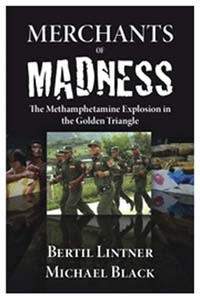A Crazy Business
The manufacture and distribution networks of the Golden Triangle’s latest drug industry are exposed
 |
| Merchants of Madness: The Methamphetamine Explosion in the Golden Triangle by Bertil Lintner and Michael Black; Silkworm Press, 2009. P 176 |
Merchants of Madness, by Bertil Lintner and co-author Michael Black, takes the reader on a wild ride through the history of that transition and exposes the main players behind it: ethnic Wa warlords, Chinese drug lords and local thugs, all protected by the Burmese military to sustain the country’s largest export after natural gas.
The book runs through a quick world history of ATS, far more widely used than most people would realize: German fighter pilots in World War II used Fliegerschokolade (“flyers’ chocolate”), which was methamphetamines mixed with chocolate, while Hells Angels biker clubs in the United States have carved out a multi-million dollar industry of domestic production and distribution.
For the past several years, everyone from the United Nations Office on Drugs and Crime to the US Drug Enforcement Administration has warned that ATS are the biggest narcotics problem in the world, especially in Asia.
It is in Thailand that ATS really took off. First, laborers and truck drivers took the pills to stay awake on the job; then in the 1990s, ATS became a recreational drug of the emerging middle-class and youth cultures. The negative social effects of what the Thais call yaa baa (“crazy medicine”) are the millions of users and a rising crime rate.
A massively expanded ATS production in northern Shan State has fuelled the dramatic increase in consumption in Asia and elsewhere.
The Burmese connection enlivens the book. Like many criminal enterprises, the ATS trade in Burma is a family affair. At the top of the business are the shadowy Wei brothers. The true mastermind of the ATS explosion, Wei Xuegang, is a living testament to the shifting alliances and bloodshed in the Golden Triangle: first he worked for the Kuomintang (KMT), then Shan warlord Khun Sa, and since the early 1990s, for the United Wa State Army (UWSA), which the US government calls Asia’s largest narco-trafficking organization.
Having escaped from Thai custody in mysterious circumstances nearly 20 years ago, Wei attempted an audacious experiment at pseudo state-building and covert drug production when he began construction of the town of Mong Yawn near the Thailand border in 1999. Wei eventually moved back north to build a massive mansion on the outskirts of the UWSA capital at Panghsang, where he apparently lives a chaste, hard-working life surrounded by hundreds of bodyguards. Wei’s two brothers are not as accomplished. One has retired, while the younger Wei Xueyin recently shot himself in the leg getting out of his car.
Taking care of the political side of the business are the Bao brothers. The leader of the UWSA, Bao Youxiang, appears to be a genuine leader of his people in the struggle for autonomy, investing drug profits into local development projects, while also indulging his penchant for ten-pin bowling and suffering from a brain illness (trichinosis) from eating raw pork. Other brothers, who hold subordinate positions in the organization, like to drive Humvees. One allegedly has a torture chamber in his house, and another died due to his prodigious yaa baa consumption.
Other merchants include Lin Mingxian, Sai Toon, Zhaing Zhiming (who retains his Chinese passport), and Wei’s arch-nemesis, the popular UWSA field commander Ta Htang, who spent several years in a Wa prison and is now out and back in business. The authors provide salacious details of many individuals and companies recently named in the US Treasury Department sanctions list.
The central theme of the book, apart from the destructive nature of the trade, is how systematic it is. Insurgency and the politics of ethnicity in Burma have fuelled narcotics production in the absence of a sustainable and equitable political solution.
1 | 2 next page »
